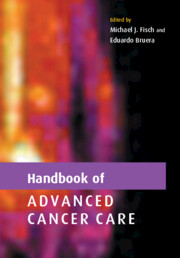Book contents
- Frontmatter
- Contents
- List of contributors
- Preface
- Acknowledgements
- PART I General concepts in oncology
- Part II Primary tumors
- Part III Management of specific symptoms and syndromes
- 41 Assessment of pain
- 42 Drugs for managing cancer pain
- 43 Difficult pain management problems
- 44 Dyspnea
- 45 Loss of appetite and weight
- 46 Fatigue
- 47 Depression and anxiety
- 48 Delirium
- 49 Constipation
- 50 Palliation of fever and sweats: the heat is on!
- 51 Bleeding in advanced cancer patients
- 52 Thrombosis
- 53 Hypercalcemia of malignancy
- 54 Lymphedema
- 55 Wound care of the advanced cancer patient
- 56 Infections in patients with advanced cancer
- 57 Urogenital complications
- 58 Brain metastases
- 59 Bowel obstruction
- 60 Bone metastases
- 61 Meningeal cancer
- 62 Pleural and pericardial effusions
- 63 Superior vena cava syndrome
- 64 Chronic nausea
- Index
- References
45 - Loss of appetite and weight
Published online by Cambridge University Press: 04 August 2010
- Frontmatter
- Contents
- List of contributors
- Preface
- Acknowledgements
- PART I General concepts in oncology
- Part II Primary tumors
- Part III Management of specific symptoms and syndromes
- 41 Assessment of pain
- 42 Drugs for managing cancer pain
- 43 Difficult pain management problems
- 44 Dyspnea
- 45 Loss of appetite and weight
- 46 Fatigue
- 47 Depression and anxiety
- 48 Delirium
- 49 Constipation
- 50 Palliation of fever and sweats: the heat is on!
- 51 Bleeding in advanced cancer patients
- 52 Thrombosis
- 53 Hypercalcemia of malignancy
- 54 Lymphedema
- 55 Wound care of the advanced cancer patient
- 56 Infections in patients with advanced cancer
- 57 Urogenital complications
- 58 Brain metastases
- 59 Bowel obstruction
- 60 Bone metastases
- 61 Meningeal cancer
- 62 Pleural and pericardial effusions
- 63 Superior vena cava syndrome
- 64 Chronic nausea
- Index
- References
Summary
Introduction
Over 50% of patients with advanced cancer suffer from loss of weight and/or appetite during the course of their disease. In a landmark Eastern Cooperative Oncology Group study, Dewys and colleagues found that loss of more than 5% of premorbid weight predicted a poor prognosis, independent of tumor stage, tumor histology, and patient performance status. This weight loss was also associated with a trend towards lower chemotherapy response rates.
How might we explain this prognostic impact? Investigators have hypothesized that loss of lean tissue is directly tied to prognosis. Because lean tissue carries all the body's metabolic machinery, these investigators have suggested there might be a cause and effect relationship between loss of lean tissue and an early demise. In fact, an excessive loss of lean tissue is a hallmark of cancer-associated weight loss. Although weight-losing cancer patients manifest loss of both fat and lean tissue, it is the loss of lean tissue that is the most dramatic and stands in stark contrast to the preferential loss of fat tissue observed in classical starvation. Thus, it may be hypothesized that a reversal of loss of lean tissue might improve prognosis. To date, however, despite ongoing investigation with such agents as eicosapentaenoic acid, thalidomide, adenosine triphosphate, anticytokine therapy, and nonsteroidal anti-inflammatory agents, this hypothesis remains unproved.
Independent of lean tissue wasting, however, a strong argument can be made for diagnosing and palliating anorexia. Wolfe and others interviewed parents of deceased children who died of cancer.
- Type
- Chapter
- Information
- Handbook of Advanced Cancer Care , pp. 369 - 373Publisher: Cambridge University PressPrint publication year: 2003



